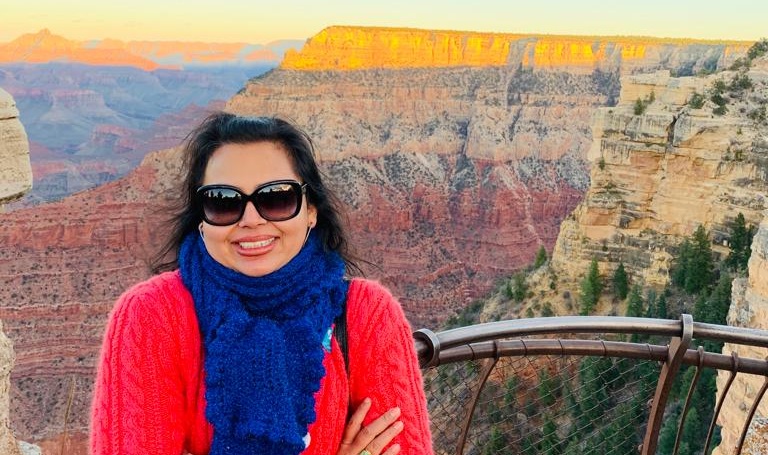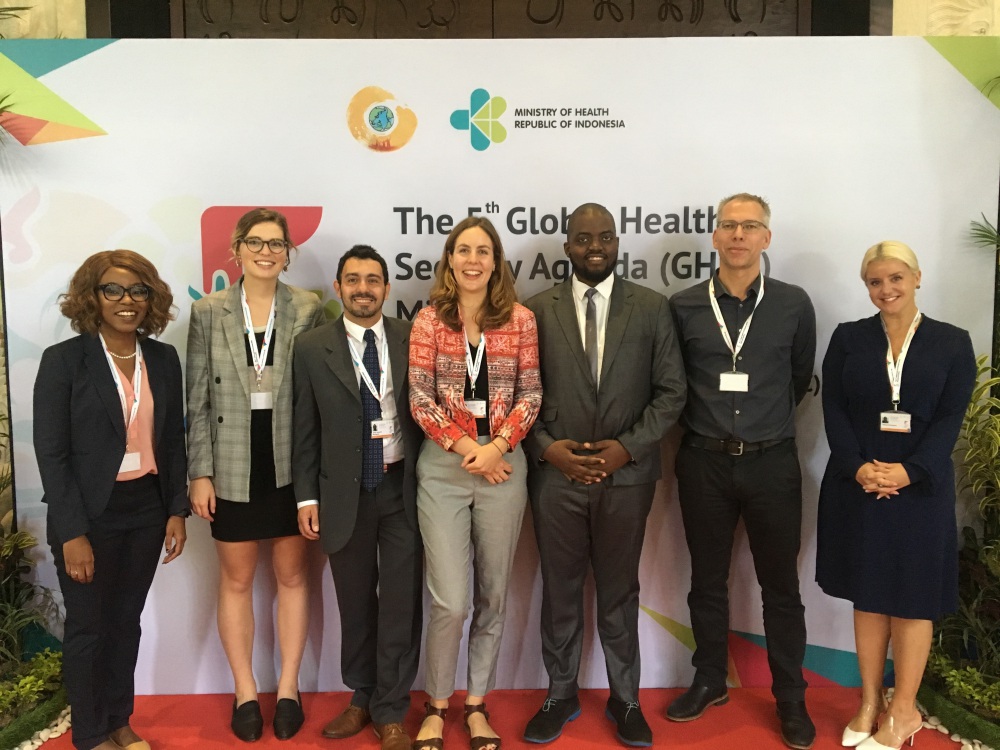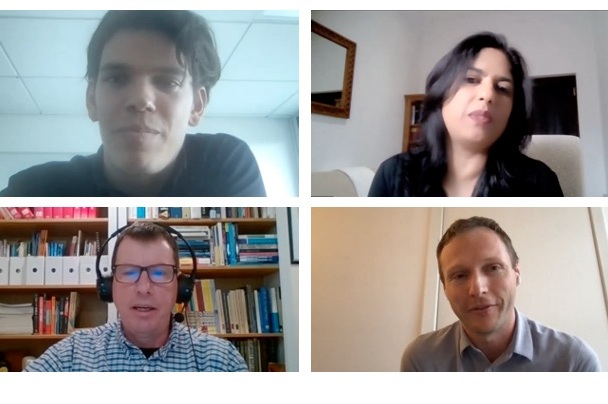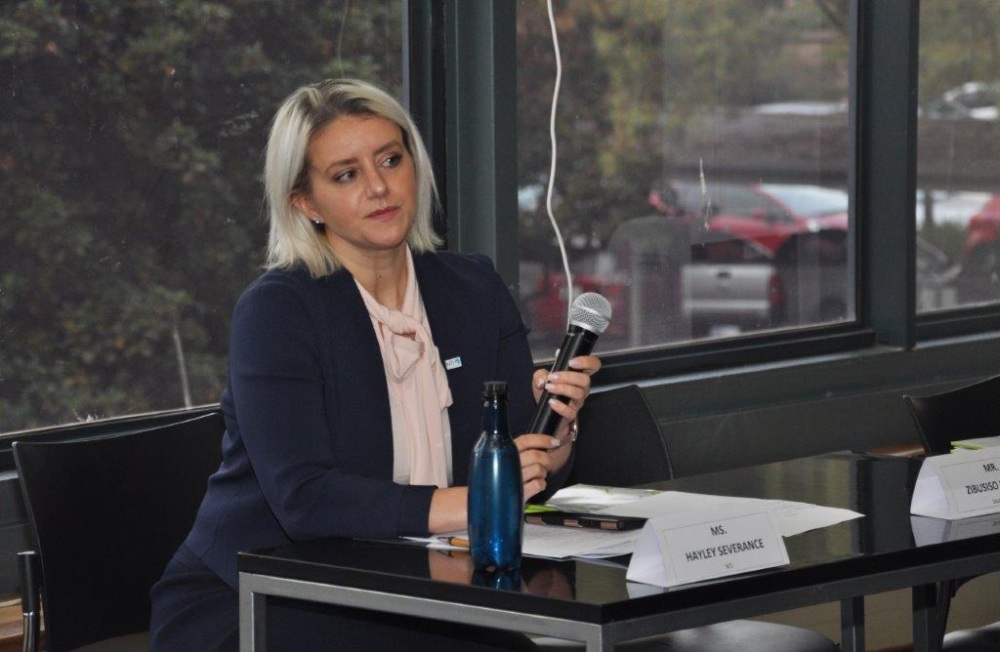
Get to Know NTI: Aparupa Sengupta
Aparupa Sengupta, senior program officer for NTI’s Global Biological Policy and Programs team (NTI | bio), sat down with NTI’s Mary Fulham for the latest in Atomic Pulse’s “Get to Know NTI” series.
Atomic Pulse
By Katherine Budeski, independent consultant, NTI | bio
Pharmacist Peter Babigumira Ahabwe was doing fieldwork in Uganda when he popped open his laptop and video messaged Dr. Frances Butcher, a public health specialist on her lunch break in Oxford, England, and Javier Rodriguez, a radiological security expert who was driving through the Mendoza Province in Argentina. These three young professionals had never met in person, but they were all members of the Next Generation Global Health Security (GHS) Network and they were discussing their innovative, winning proposal for the 2018 Next Generation for Biosecurity Competition.
That the young, geographically diverse team used technology to find each other and to work together to develop a proposal that advances biosecurity and biosafety efforts globally was emblematic of the project and the competition. The complex issues in the field of biosecurity and biosafety require broad-spectrum, global solutions that can only be carried forward by the engagement of the next generation of professionals in the field.
To help generate momentum and engagement, NTI | bio, in partnership with the Next Generation GHS Network, launched the second Next Generation for Biosecurity Competition in 2017. This year competitors were asked to either: develop training and networking opportunities for professionals of all levels to develop an interest and further proficiency in the biosecurity and biosafety fields; and/or to foster opportunities for educational outreach to raise public awareness around the importance of biosecurity and biosafety. All teams were required to be cross regional and multisectoral, underscoring the importance of promoting a global cadre of young professionals dedicated to reducing catastrophic biological risks.
Peter Babigumira Ahabwe, Makerere University, Uganda; Dr. Frances Butcher, Oxford School of Public Health, UK; and Javier Rodriguez, National Commission of Atomic Energy, Argentina, submitted their proposal in August: “Act Like a Pro: Scenario-Based eLearning for the Next Generation of Biosecurity Learners,” an openly accessible online platform for students and entry-level professionals that will feature a forum for peer-to-peer discussion, monitored by a biosecurity expert. Students and entry-level professionals will be able to complete eLearning scenarios about safely collecting infectious disease samples in the field in Uganda, learn about biosecurity procedures in Argentina, or think about dual-use dilemmas in the United Kingdom.
Biosecurity and biosafety issues around the word are unique to each country and region. Biosecurity is vital to preventing the misuse and theft of dangerous pathogens and in guarding against deliberate biological weapons attacks; biosafety is critical to protecting people and animals from accidental releases of dangerous agents or preventing unintended consequences of biological experiments. By providing country-specific examples, anyone who accesses the “Act Like a Pro” platform will experience the diversity of challenges in both fields across the globe.
The winning proposal was selected from submissions from 14 countries and across six continents. The first place team will receive mentorship from NTI | bio and the Next Generation GHS Network along with a grant of $15,000 to implement their proposal.
“The collaboration between members from such different regions invited us to reflect on the different issues we face in each of our countries, and surely it enriches our vision on how to deal with the different restrictions and barriers that we usually find, be they budgetary, political, bureaucratic or cultural,” Rodriguez said. “I think that the more cross-sectorial and cross-regional interaction there will be, the more complete will be our abilities to face and solve the daily issues related to this matter.”
His teammate, Babigumira Ahabwe, said, “The next generation has a chance to excel at cross-regional collaboration because just as globalization makes it easier for diseases to travel borders, it also lends increased potential for international collaboration. For example, we have managed to collaborate on this project proposal from three continents without ever meeting in person.”
Cross-regional participation was a theme not only of the proposal writers but also of the judging panel. An international expert panel of 24 judges from seven countries evaluated proposals across five continents. Dr. Mark van Passel, a competition judge from the Netherlands representing the Netherlands National Institute for Public Health and the Environment (RIVM), reflected on the competition describing it as, “an exemplary enterprise that forged international dialogues and helped materialize good ideas to actual, concrete project proposals. It bridged boundaries of expertise: it connected veterinarians with public health experts, policy advisors with scientists, and combines e-learning initiatives with traditional conferences. Finally, by providing a start-up budget for the project, as well as a podium to showcase the winning projects, the competition supported new initiatives to meet funding partners, and thereby creating the future.”
Dr. Greg Koblentz, another competition judge and the Deputy Director of the Biodefense Graduate Program at George Mason University, added that the competition was, “an amazing initiative that brought together students and young professionals from around the world to develop new solutions to the most pressing challenges in global health security.” Koblentz added that “to sustain the hard-won gains already made in global health security, we need to make sure that the next generation of researchers and practitioners in developed and developing countries are prepared to address critical biosafety and biosecurity issues.”
Dr. Issa Makumbi, a competition judge representing the Ministry of Health Uganda, summed it up: “Integrating biosecurity into competitions such as this helps acknowledge the contributions of younger generations of biosecurity professionals and gives them resources and guidance to plant seeds of biosecurity around the globe that may grow fruit for future generations to come.”
In addition to project funding, the winning team was recognized at the 5th Annual High Level GHSA Ministerial Meeting, which was held in Bali, Indonesia from November 6-8, 2018. On November 7th, the team presented during the Next Generation GHS Network side event and fielded questions from an international audience of ministerial-level delegates from 64 nations and representatives from several international and non-governmental organizations.
“It’s crucial that biosecurity does not remain an issue for experts, only discussed at a high level, but feeds down to those working in laboratories, fieldwork and academia,” Dr. Butcher told the audience. “It is the entry-level professional in the lab, the student in virology, and other early career professionals that need to be targeted because these individuals are often particularly vulnerable to these risks, and we want the culture of responsibility to be normalized from the beginning of their careers.”
Judges of the 2018 Next Generation for Biosecurity Competition
Dr. Beth Cameron, Vice President, Global Biological Policy and Programs, NTI | bio
Hayley Severance, Senior Program Officer for Global Biological Policy and Programs, NTI | bio
Katherine Budeski, Independent Consultant, NTI | bio
Dr. Jamechia Hoyle, Coordinator, Next Generation Global Health Security Network
Taylor Winkleman, Deputy Coordinator, Next Generation Global Health Security Network
Dr. Aamer Ikram, Executive Director, National Institute of Health, Pakistan
Dr. Issa Makumbi, Director of the Public Health Emergency Operations Centre, Ministry of Health of Uganda
Dr. Rebecca Katz, Associate Professor and Director, Center for Global Health Science and Security, Georgetown University
Dr. Lance Brooks, Department Chief, U.S. Department of Defense, Cooperative Biological Engagement Program
David Gillum, Associate Director, Institutional Biosafety Officer, Arizona State University
Rebecca Moritz, Select Agent Program Manager and ICDUR, University of Wisconsin
Dr. Greg Koblentz, Director, Biodefense Program George Mason University
Dr. Rocco Casagrande, CEO, Gryphon Scientific
Dr. Corrie Brown, Professor, Pathology/International Medicine, University of Georgia College of Veterinary Medicine
Joanne Michelle Ocampo, Project Director, Georgetown University
Dr. Jennifer Nuzzo, Senior Scholar, Johns Hopkins Center for Health Security
Susan Loubser, Director, Global Biorisk Management Institute
Dr. Mark van Passel, Project Coordinator, National Institute for Public Health and the Environment, Netherlands
Dr. Ernesto Gozzer, Associate Professor, Universidad Peruana Cayetano Heredia
Zibusiso M. Masuku, Biosafety Technical Manager, National Institute for Communicable/Diseases National Health Laboratory Service, South Africa
Ashley Tseng, 2017 Winner Next Generation for Biosecurity Competition
Sign up for our newsletter to get the latest on nuclear and biological threats.
Aparupa Sengupta, senior program officer for NTI’s Global Biological Policy and Programs team (NTI | bio), sat down with NTI’s Mary Fulham for the latest in Atomic Pulse’s “Get to Know NTI” series.
Today, leaders preparing for the BWC’s Ninth Review Conference in August are exploring whether the global community can leverage increased attention and political will to strengthen the BWC by building mechanisms that increase transparency and trust with the goal of reducing the risk of global catastrophic biological events. A particular aim is determining whether there are effective and politically viable ways to enforce the treaty.
An epidemiologist focused on preventing catastrophic biological events and building health security capacity around the world, Hayley Anne Severance brought her expertise to NTI’s expanding biosecurity team in 2018.


